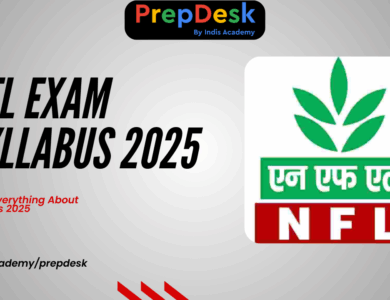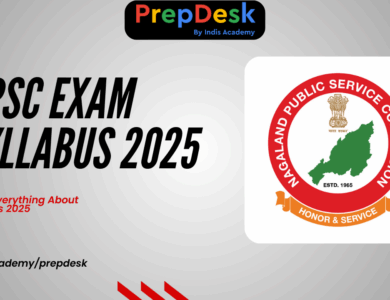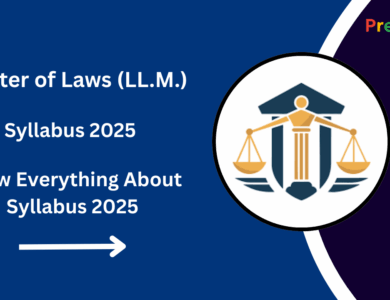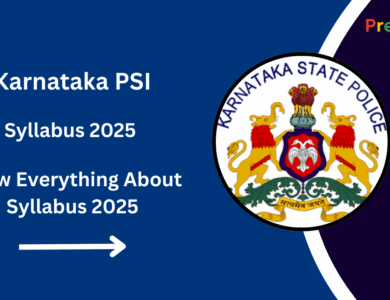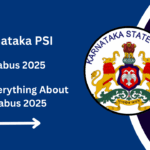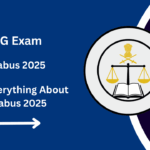M. Pharm Syllabus 2025 | Semester-Wise PDF, Subjects & Specializations
Discover the complete M. Pharm Syllabus 2025—detailed semester-wise subjects, PDF download links, specialization tracks, marks structure, and recommended books for Pharmaceutics, Pharmacology, QA, Pharma Chemistry, and more.
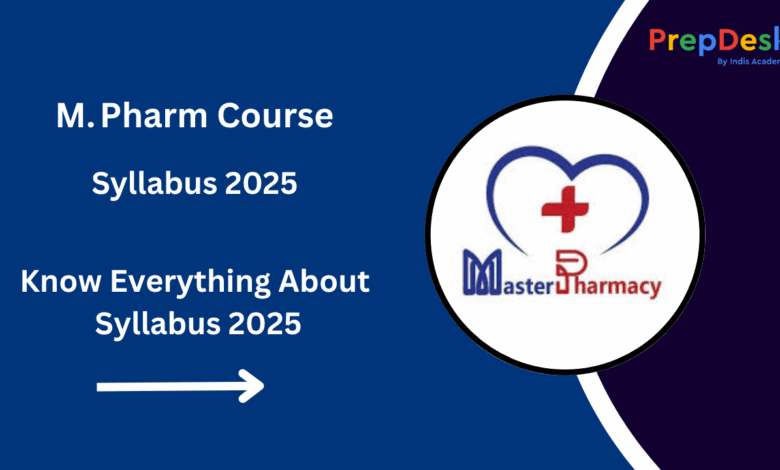
The Master of Pharmacy (M. Pharm) is a two-year postgraduate program designed to equip students with advanced knowledge in pharmaceutical sciences. If you’re planning to pursue M. Pharm in 2025, understanding the latest syllabus is crucial for effective preparation and academic success.
In this article, we provide a complete, SEO-optimized, and structured guide on the M. Pharm syllabus including semester-wise subject lists, topic descriptions, marks distribution, recommended books, specialization details, and preparation strategy. You can also download the official M. Pharm syllabus PDF at the end.
M. Pharm (Master of Pharmacy) is a professional degree program that deepens the understanding of drug formulation, discovery, regulation, and delivery. It is offered under various specializations like Pharmaceutics, Pharmacology, Pharmaceutical Chemistry, and more.
- Duration: 2 Years (4 Semesters)
- Eligibility: B.Pharm with minimum 50% marks + GPAT (preferred)
- Regulatory Body: Pharmacy Council of India (PCI), AICTE, UGC
M. Pharm Exam Overview
| Component | Details |
|---|---|
| Course Duration | 2 Years (4 Semesters) |
| Mode of Study | Semester System (Credit-Based) |
| Specializations Offered | Pharmaceutics, Pharmacology, QA, etc. |
| Minimum Eligibility | B.Pharm with 50%+ (GPAT Preferred) |
| Exam Type | Internal + University Semester Exams |
| Marks System | Theory + Practical + Dissertation |
| Mandatory Project Work | Yes (Research Thesis in Final Year) |
M. Pharm Semester-wise Subjects and Topics
Here is the complete semester-wise syllabus for M. Pharm (General & Specializations). The syllabus is aligned with PCI norms.
Semester I – Core Fundamentals
| Subject Name | Key Topics | Marks |
|---|---|---|
| Modern Pharmaceutical Analytical Techniques | UV-Vis, IR, NMR, Mass Spectrometry, Chromatography (HPLC, GC), Calibration | 100 |
| Drug Delivery System | Controlled Release, Nanotechnology, Transdermal Systems | 100 |
| Modern Pharmaceutics | Pre-formulation, Scale-Up, Optimization, ICH Guidelines | 100 |
| Regulatory Affairs | Indian, USFDA, EMA, TGA, ICH Guidelines, Patent Law | 100 |
| Practical – I | Based on Analytical & Delivery Systems | 100 |
| Seminar | Topic presentation on current pharmaceutical trends | 50 |
Semester II – Advanced Studies
| Subject Name | Key Topics | Marks |
|---|---|---|
| Molecular Pharmaceutics | Polymers, Biodegradable Carriers, Microemulsions | 100 |
| Advanced Biopharmaceutics & Pharmacokinetics | Compartment Models, Bioavailability, Clearance | 100 |
| Computer-Aided Drug Delivery System | Simulation Tools, Pharmacokinetic Modeling, Software (e.g., GastroPlus) | 100 |
| Cosmetics and Cosmeceuticals | Formulation of creams, powders, FDA guidelines | 100 |
| Practical – II | Experiments based on drug delivery and modeling | 100 |
| Seminar | Industry-relevant research or case study presentation | 50 |
Semester III – Research Methodology & Journal Club
| Subject Name | Key Topics | Marks |
|---|---|---|
| Research Methodology & Biostatistics | Data Analysis, SPSS, Sampling, Hypothesis, ANOVA, T-test | 100 |
| Journal Club | Analysis & Review of Current Pharmaceutical Research Papers | 50 |
| Research Work – I | Literature Review, Synopsis, Initial Experiments | 150 |
Semester IV – Dissertation and Viva
| Subject Name | Key Topics / Components | Marks |
|---|---|---|
| Research Work – II | Final Dissertation, Report Writing, Data Interpretation | 200 |
| Viva Voce | Project Defense, Internal & External Examiner Evaluation | 100 |
M. Pharm Syllabus PDF Download
Click the button below to download the latest official M. Pharm syllabus (PCI-approved):
Download M. Pharm Syllabus PDF 2025
M. Pharm Specializations
| Specialization Name | Key Focus Areas |
|---|---|
| Pharmaceutics | Drug Design, Delivery Systems, Industrial Pharmacy |
| Pharmacology | Drug Action, Mechanisms, Preclinical & Clinical Studies |
| Pharmaceutical Chemistry | Drug Synthesis, Molecular Chemistry, SAR |
| Quality Assurance | GMP, QA/QC, Audits, Documentation |
| Pharmacognosy | Herbal Medicine, Natural Products, Phytochemistry |
| Industrial Pharmacy | Process Validation, Scale-Up, Technology Transfer |
| Pharmaceutical Technology | Nanotech, Novel Drug Systems, Formulation Tech |
Recommended Books for M. Pharm
| Subject | Recommended Books & Authors |
|---|---|
| Pharmaceutics | Lachman & Lieberman, Pharmaceutical Dosage Forms |
| Pharmacology | Rang & Dale, Goodman & Gilman’s, KD Tripathi |
| Analytical Techniques | Chatwal & Anand, Beckett & Stenlake |
| Regulatory Affairs | Sathyanarayana, Manuals on FDA/ICH Guidelines |
| Research Methodology | Kothari, Marcoulides (Biostatistics) |
M. Pharm Preparation Tips
- Understand Core Concepts: Focus on fundamentals like pharmacokinetics, drug delivery, formulation techniques, and regulations.
- Stay Updated: Regularly follow research journals like IJPER, Pharmaceutical Research, and PubMed.
- Use Simulation Software: Learn GastroPlus, MATLAB, or Design Expert for research modeling.
- Start Early Research: Choose project topics in Semester III aligned with your career goals.
- Prepare for Ph.D./GPAT: Utilize free time in Semester II for higher study exam preparation.
Career Specializations after M. Pharm
| Career Path | Area of Work |
|---|---|
| Research Scientist | R&D labs, CROs, Formulation Research |
| Clinical Pharmacologist | Hospitals, Clinical Trials |
| Regulatory Affairs Executive | Drug Licensing, Dossier Filing |
| QA/QC Analyst | Manufacturing Units, Pharma Companies |
| Teaching Faculty | Pharmacy Colleges, Universities |
| Industrial Pharmacist | Formulation, Scale-Up, Production Plants |
Conclusion
The M. Pharm syllabus 2025 is designed to balance theory with practical application and industry relevance. From advanced analytical techniques to regulatory affairs and hands-on research work, the curriculum provides students with the right tools for a thriving career in pharmaceutical sciences.
By following the semester-wise breakdown, using the right books, and staying focused on research, you can maximize your learning and career potential.
FAQs – M. Pharm Syllabus
- Q1. What is the duration of M. Pharm?
A: 2 Years (4 Semesters) - Q2. Is project work compulsory in M. Pharm?
A: Yes, dissertation work is mandatory in Semester III and IV. - Q3. Is GPAT score required for admission?
A: Not always, but it’s preferred and offers scholarships. - Q4. Which is the best specialization in M. Pharm?
A: Pharmaceutics and Pharmacology are widely preferred for research and industry roles. - Q5. Where can I download the M. Pharm syllabus PDF?
A: You can download it from the official university or PCI website (link provided above).
